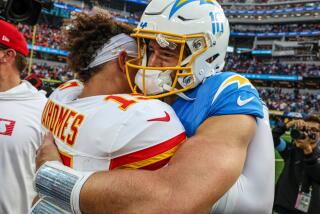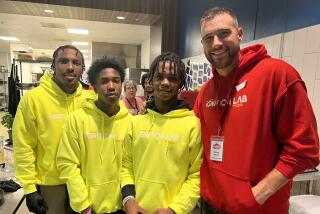Alex Smith has reinvented his play and his legacy with the Chiefs
The words were sympathetic and surprising.
Before Alex Smith made his first start for San Francisco in 2005, the mother of legendary 49ers quarterback Steve Young pulled his parents aside and offered her condolences.
“She said, `Oh, I’m so sorry for you. I can’t imagine having to go through that ever again,’” Doug Smith recalled. “Both my wife and I were thinking, `Gosh, that’s kind of unusual for her to say.’”
It didn’t take long for the Smiths to figure out what she meant. It can be tortuous being the parent of an NFL quarterback, particularly one playing for a team as bad as the 49ers were at the time. Indianapolis intercepted four of Smith’s passes in that 28-3 rout and sacked him five times.
It was a troubling omen for Smith, selected No. 1 overall, who endured eight tumultuous seasons in San Francisco. The 49ers cycled through three head coaches and seven offensive coordinators during that span.
All that seems a distant memory to Smith, 33, who has been Kansas City’s quarterback since 2013. But, as one of the NFL’s hottest hands heading into Sunday’s game at the Chargers, he has a special appreciation of the relative coaching and system stability he enjoys with the Chiefs.
“When you have a ton of turnovers, it’s hard for anybody to get to an advanced level, not just the quarterback,” he said. “You see when guys have been in a system multiple years how much further along you are, how much shared history and foundation you have to fall back on and lean on.”
So far this season, the pieces are falling into place for the Chiefs. They stunned New England in the NFL’s kickoff game, upsetting the defending Super Bowl champions on the road 42-27, piling up the most points ever scored on the Patriots in the era of coach Bill Belichick. Kansas City won its home opener the following week 27-20 over Philadelphia, the former team of Chiefs coach Andy Reid.
Smith doesn’t force a lot of passes or make many mistakes. Since he arrived in Kansas City four years ago, only 1.41% of his attempts have been intercepted. That’s third-best in the NFL behind Tom Brady (1.24%) and Aaron Rodgers (1.34%). He’s the most accurate passer in Chiefs history among quarterbacks with at least 700 attempts with a 64.9% completion rate.
His detractors see that as more evidence he’s a “game manager,” which has become a dismissive, almost derisive term. But as he showed in the win at New England, when he threw four touchdown passes and completely upstaged Brady, he is increasingly comfortable throwing the ball upfield, a byproduct of having better skill players around him.
“He’s throwing rockets,” said Young, an ESPN color analyst. “I think he’s kind of extended his throwing motion a little bit so he can put more power in it. He’s always been really accurate and relatively careful. But now the deep ball is different.”
Back when Smith was playing for San Francisco — where he ultimately lost his job to Colin Kaepernick — Young urged him to cut it loose a little more and trust his throws. That seems to be happening.
“I see a stronger arm,” Young said. “I see more aggression. I see more willingness to take risks.”
Young compares that step forward to when watching Green Bay’s Brett Favre inspired him to be less cautious.
“Brett and I ran the same plays,” Young said. “We could trade huddles and it would be 100% the same. So they’d run the same plays near the end zone and I’d see it and say, `There’s no one open!’ Then, [Favre] would make some play, loop it in and figure out some way to get the ball in there. I’d just drop it off.”
In studying those tapes, Young developed a theory: “It taught me how much more art there is down there [near the goal line]. Science gets you to the 20, and then art gets you the rest of the way.”
He reasoned it was what was missing from Smith’s game in the early part of his career, when he took too much of a play-it-safe approach.
“Alex, in my mind, needed to leave the science and join the art a little bit,” Young said. “Then again, he didn’t have a lot of weapons, either. You have to have someone to go create the art with.”
The Chiefs now have an All-Pro tight end in Travis Kelce, the AFC’s most dangerous playmaker in receiver Tyreek Hill and a budding superstar in rookie running back Kareem Hunt, who has five touchdowns in his first two games.
“It’s been a great start,” Smith said.
But it’s not a perfect situation. This offseason, the Chiefs traded up in the first round to select Texas Tech quarterback Patrick Mahomes with the 10th pick. With the fresh-armed rookie waiting in the wings, Smith is convinced he will be playing elsewhere next season.
Asked whether the drafting of Mahomes was motivating or demoralizing, Smith said: “I would say neither of those things. I don’t need any extra motivation. If you did, that would be a problem. And no, not demoralizing. I get it. [Quarterback] is one of the most important and impactful positions in sports. You touch the football every single play. You impact the game more than anybody, so you’d be crazy not to stockpile talent.”
However, Smith’s father, a former high school coach and retired principal in San Diego, conceded it was difficult as a parent and fan to see the Chiefs draft a quarterback in that spot.
“You consciously, cognitively know this is the NFL, that’s part of the nature of the business,” the elder Smith said. “Your planned replacement, that’s always in the plan.
“But on the other side of that coin is, you say to yourself as a parent and a fan, `Well, I wish they had traded up for a dynamic whatever — right tackle, inside linebacker, another receiver.’ You could just put the names in there that, from a parent perspective, could step on the field and help them win. Rather than trading all that away to replace your son.”
Doug Smith knows how strong, determined and resilient his son is. For better or worse, Alex has always been that way.
“When he was young, it just came out as extremely hard-headed and stubborn,” his father said. “As we were raising him, we hoped that some day that would show up as an attribute. Being resilient.
“We clearly said that he’s a kid you can’t take out in public. He was so obstinate and ornery. We gave up on any kind of spanking; that did no good. He was absolutely not dissuaded by the fact that you just swatted his butt. We’d tell him, `You just go stand over there in the corner until we figure out what we’re going to do.’ He lived his life in the corner.”
That never-give-in grit helped Smith in San Francisco, and it’s helping him now, as he’s continually tightening his grip on the starting job.
“He’s a hard worker and has determination,” Doug Smith said. “Anybody who could have survived those eight years with the 49ers and their dysfunction certainly shows a high level of determination. Lots of players didn’t. If you go back to that time, there aren’t many left.
“I guess you could say he’s still standing, and there were a lot of knockdowns there. It’s translated into an underlying attitude of perseverance and resilience.”
Twelve years later, the Smiths have a special appreciation for the thoughtful words Young’s mother had for them.
For Smith’s father, there are other words of sympathy that likewise linger in his memory. They came from a Patriots supporter at Gillette Stadium two weeks ago.
“One of the fans said to me early on in the game, `Gosh, I’m sure sorry for you guys having to come here. This is just a really hard place to play,’” he said. “Then, by the time there’s five minutes left in the game, they’re all gone. They’re not even there.
“There’s nothing more satisfying than people who are telling you how sorry they feel for you at the start of the game, and by the time the game’s over it’s, ‘Sorry you guys had to go home.’”
Follow Sam Farmer on Twitter @LATimesfarmer
More to Read
Go beyond the scoreboard
Get the latest on L.A.'s teams in the daily Sports Report newsletter.
You may occasionally receive promotional content from the Los Angeles Times.











